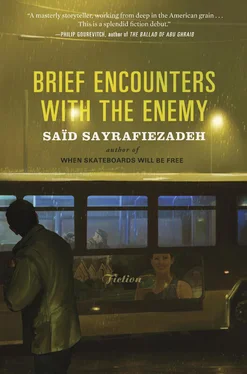That could have been the end if I hadn’t run into her again, not over twenty minutes later, as I was wheeling my trash bin past the row of hot soups. This time she was putting a plastic spoonful of clam chowder into her mouth, tasting it slowly and making a big show of considering its merits before moving on to the next selection. She was trying to appear as if she were having a small sample of each before deciding which one to purchase, but it was clear that she was one of those people who intended to eat an entire meal within the confines of the supermarket. I didn’t appreciate this, because I’m a company man at heart, but she was a poor girl — I could tell that now — and since I have my own struggles, I felt some affinity for her. She was doing her best to conceal the reality of her condition, but I’ve learned well that the unforgiving fluorescent lights of the supermarket eventually reveal all, and seeing her poised above the steaming pots of soup, I noticed that her long chocolate hair was unwashed and unkempt, and her fuzzy coat had tufts missing from the collar and wrists.
Coming down the aisle was Ziggy, pushing his shopping cart filled with two weeks’ worth of groceries. He wasn’t a customer. He was an undercover, and today he was dressed like a soldier in camouflage and combat boots. Yesterday he’d been a construction worker wearing a hard hat and tool belt. Tomorrow he might come dressed as a baseball player or whatever other profession struck his fancy. Halloween was two months away, but for him every day was Halloween. “Why don’t you come one day dressed as an undercover?” I joked with him once.
“Because I’d give myself away,” he had responded solemnly. He was slow like that sometimes.
He winked at me as we passed each other. He knew what the girl was up to, and he knew that I knew. He loved this. He lived for this. I’d known him since middle school, where he had developed a passion for tattling. He once tattled on a girl for copying off his math test, even though it was no skin off his back. Her parents had to be brought in for a conference. Things like that can mar you for life. Now he earned twice as much as I did, and he didn’t do anything but spend his day strolling up and down the forty-eight aisles, gazing at the assortment of products, studying, pondering, selecting, then handing me his shopping cart at the end of his shift so I could return every single item to the shelves. Most days he was just an endless shopper full of suspicion of other shoppers, hoping for his intuition to be proved right to affirm him and release him from his tyranny of wandering. His original dream was to be a cop, but like a lot of people’s dreams, this one was dashed, mainly because he failed the written exam three times. “They’re all idiots anyway,” he told anyone who would listen, near tears, inverting the judgment. He was thinking about joining the army now. Once the war ended, of course. Or the marines. He was chubby and easily winded, but I supposed he had a shot. “Keep striving for your goal,” I encouraged him. It was what my father always said when he found himself at a loss for what to tell me next.
Ziggy passed me as I passed her. She had moved on to sampling the broccoli soup. I wanted to hang around long enough to see the exciting moment of revelation when the soldier takes his true form and removes his store ID, but the loudspeaker clicked on just above my head, and Mr. Moskowitz, as if he were a fire captain ordering his men into the burning building, screamed with great urgency, “There’s a cleanup in aisle thirty-nine!” So I had to wheel my trash bin around and return the way I had come, through the maze of aisles, past the cheese court and the chocolate confectioner and the ice cream parlor, to the back room, where I retrieved my mop and bucket from the mop and bucket closet, then hurried all the way to aisle thirty-nine, where someone, through negligence or spite, had knocked over a display of molasses. A half-dozen bottles lay smashed in the middle of the floor, and from them oozed a great puddle that was widening slowly, almost imperceptibly, oozing across the aisle as if it were a lake at the beginning of time that, if left long enough, would engulf the entire supermarket.
No, I don’t have a problem cleaning: I hold the mop in my good hand and the crook of my bad arm, and I swing it like a normal person, and when I need to rinse it out, I dip it in the bucket, keeping it tight against my chest as if I’m dancing close, and I wring it out with my good hand, and that could also be just like a normal person.
Midway through my endeavor, three cashiers walked by on their way to the break room. “Hiiiiiiiiiiiiiiii, Max,” they said. Sabrina and Jessica and Melanie. They wore fake nails. They wore eye shadow. They chewed gum.
“Hiya,” I said, and I paused to watch them sashay their way down the aisle.
After that, Pink from coffee came past, high on pot and wired on caffeine, wearing his giant watch that glinted in the fluorescent light. I was waiting for him to get fired so I could take his job. How hard is it, really, to pour a cup of coffee?
He said rapid-fire, “Working hard or hardly working?” Which is what he says almost every time.
“Workingly hard,” I responded.
He never stopped thinking this was hilarious, and he laughed in slow motion, bending in two and propelling himself forward as if ascending a mountain.
And then Howie from deli came past. I could smell him before I saw him. He reeked of salami and cologne, the latter of which he used in an attempt to camouflage the former. He wasn’t much older than me, but he acted like an elderly man, joyless and embittered, whose best days were behind him, which they probably were. He slouched noticeably to his right, almost like a hunchback, because he spent eight hours a day slicing four-pound blocks of meats and cheeses. I’d switch jobs with him any day too. He didn’t look up when he walked by. He said without any trace of humor, “What’d you do, Max, huh, take a shit on the floor?”
When the customers came by, they were all smiles, real sweet smiles, real sympathetic smiles, and they stepped lightly and took an extra-wide berth to show their consideration and compassion.
“You’re an inspiration, Max,” they’d say, addressing me by way of my name tag.
At one point, a husband and wife arrived with two shopping carts and five children, three of whom wanted to play in the puddle of molasses. The other two stared at me while they aimlessly waved small American flags that were being sold at the front of the store for ninety-nine cents. While the wife was trying to corral the younger ones, the husband took the time to tell me that I was living proof that if people really wanted a job, they could have one.
“There’s good and bad in all people,” he said.
“You got that right,” I said.
“That’s why we’re in this mess today,” he said, meaning the war and meaning society. He was getting worked up and wanted to keep talking about the guys he knew who were over there fighting, and the guys he knew who were over here doing nothing. I would have let him keep talking, but his wife said they should go so I could get back to work.
Before she left, she leaned in close, discreetly, and said as if telling me a secret, “You’re one of God’s angels, Max.”
When I got back to the back room, justice was running its course. The girl with the acne was sitting on top of a giant cardboard box filled with containers of laundry detergent. One of her wrists was handcuffed to the steam pipe that ran two hundred feet to the ceiling, and she was rocking back and forth, explaining how it was a big misunderstanding. They all said it was a big misunderstanding after they’d been caught. I once watched a man try to claim he had no idea there were eight packs of cigarettes down his pants.
Читать дальше












